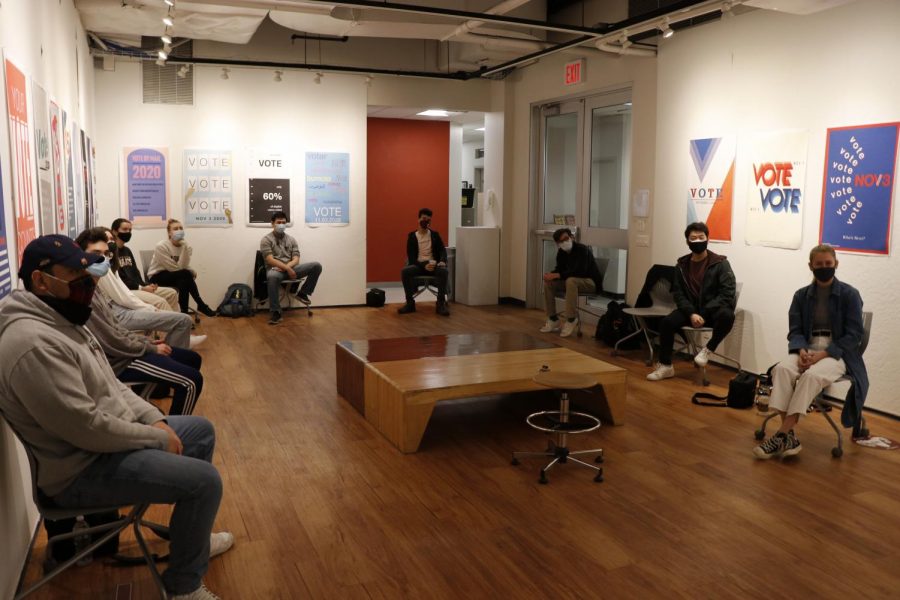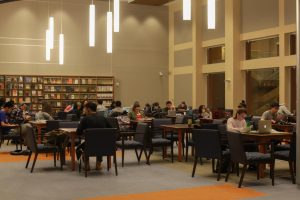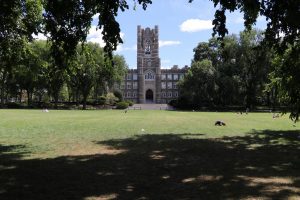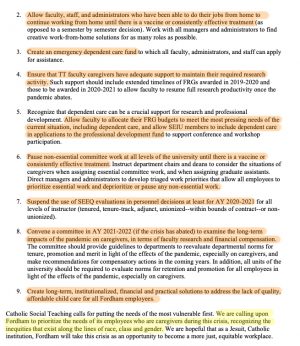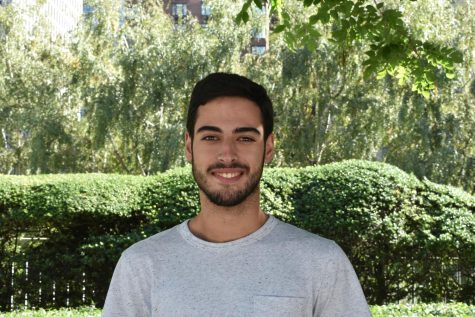Early Announcement of In-Person Fall Semester Produces Mixed Reactions
Fordham plans to return to traditional campus operations with hopes that all Fordham community members are vaccinated by the summer
A small percentage of classes are being held in person this semester, but the university plans to return to full in-person instruction in the fall. The decision has sparked both excitement and concern from students and faculty, especially since there are still six months until the semester’s start.
March 14, 2021
The first day of March 2020 began with New York’s first confirmed case of the coronavirus. By March 9 there were more than 100 cases in the state, and Fordham, like other universities, halted in-person instruction and shifted coursework and campus activities to online modalities.
On the one-year anniversary of the suspension, University President Rev. Joseph M. McShane, S.J., announced that the university is preparing to offer a fully in-person fall 2021 semester.
Yet, the U.S. surpassed 500,000 coronavirus-related deaths in February 2021 and there are still more than 29 million cases around the country as of March 14.
Dennis Jacobs, senior vice president for academic affairs, referred to McShane’s email as a message of directionality and said that more guidance will come in the months ahead.
“The only thing we can say at this point is that we will not compromise the safety of individuals or the community as a whole. That is job number one,” he said.
The Reasons Behind Announcing Six Months Ahead of Time
The purpose behind the early announcement was to aid faculty in preparing for the fall semester, provide guidance to admitted students to base college decisions on and allow students extra time for planning their academic schedules.
The decision to announce the full operation of Fordham’s campuses six months in advance of the fall 2021 semester was based on the new Centers for Disease Control and Prevention (CDC) guidelines and U.S. goals to extend vaccine eligibility to all adults by May.
On March 8, the CDC issued new COVID-19 guidelines. Vaccinated individuals can now gather indoors with other vaccinated individuals without wearing masks or social distancing. They can also visit with one other household that does include vaccinated individuals if that household is at “low risk for severe disease.”
Jacobs said that these guidelines are promising since they change the constraints for university operation and can affect how classrooms, dining halls, residential buildings and club meeting spaces will function in the fall when students and staff are vaccinated.
The New York Times predicts that at the U.S.’s current pace, 90% of adults will have received their vaccine by Aug. 22 — only two weeks before the start of the fall semester on Sept. 1.
It is still too early to predict what life will be like in the fall, but Jacobs said that the university wanted to signal its plans as early as possible “without being irresponsible.”
According to the CDC, there is still the possibility for vaccinated people to host the coronavirus and spread it to others. Jacobs said that he hopes with the Fordham community vaccinated, students will come into contact with the virus “dramatically less.”
The purpose behind the early announcement was to aid faculty in preparing for the fall semester, provide guidance to admitted students to base college decisions on and allow students extra time for planning their academic schedules.
Registration for summer 2021 courses on March 8 was the busiest day for Fordham’s online banner service in the university’s history, according to Jacobs. Since summer and fall registration are very closely linked, he said that the university wanted to provide clarity for students with the fall registration period approaching.
Making the Decision
Conversations around fall planning have been ongoing for two months with deans and leadership in the faculty senate.
Jacobs said that there was no effort to hold or accelerate the March 9 announcement, and the email was likely to be sent to the community during that week regardless. “Once we crafted the letter, we realized the anniversary was on the ninth. It made it particularly salient to send it on that day,” he said.
Fordham’s reopening plan for the fall 2020 semester, Fordham Forward, was released on June 30, giving students who wished to return to campus only four to six weeks to plan and quarantine.
“The governor was setting all the rules for reopening last spring. We were under strict order that we could not reopen as a university until we submitted a plan, and the guidance from the state was very late in coming,” Jacobs said. Gov. Andrew Cuomo released reopening guidelines for universities three weeks prior to Fordham’s announcement of Fordham Forward.
Jacobs said now that the university understands how to operate with the existence of the virus, the plans for the fall are more apparent than last year.
Jacobs said the university is hoping to improve its technology and continue to offer different modalities for classes — including in-person, hybrid and online.
Although plans cannot yet be ascertained, Jacobs said that social distancing and mask requirements will most likely be able to be relaxed in residential living and other environments where the population is fully vaccinated. In more “high-risk” scenarios — such as a sports event or a lecture with a speaker from off-campus — it is more likely that health guidelines will remain intact.
Ritamarie Pepe, Fordham College at Lincoln Center (FCLC) ’22, said she is hopeful about the fall semester and ready to reengage in in-person activities but is frustrated by how early the university announced its plans.
“It is irresponsible to say something like that so early when we are still waiting to see a lot of things play out,” she said.
Accommodations for students unable to return to campus will be managed on an individual basis. Jacobs said the university is hoping to improve its technology and continue to offer different modalities for classes — including in-person, hybrid and online.
Concerns About the Announcement
“It seems like a bold claim from the school to anticipate and assume the country will have a good hold on the virus by then, or more specifically that our peers will be better about the virus and restrictions by then.” Annabel Filpo, FCLC ’23
Jacobs described two different “camps” of reactions within the Fordham community: excitement and concern.
Only three weeks before the news, Rose Hill halted in-person operations when the campus surpassed 100 cases. The campus currently has an infection rate above 3% as of March 13.
Jacobs said it is important to continue to be cautious even with “a light at the end of the tunnel.”
“We saw in the last couple weeks just how quickly the virus can spread on campus,” he said. “We need to retain the approach of safety.”
Annabel Filpo, FCLC ’23, said she would be optimistic about returning to in-person classes after only experiencing one full semester on campus in 2019, but she said she is mostly concerned and skeptical about the premature announcement and other students’ actions.
“It seems like a bold claim from the school to anticipate and assume the country will have a good hold on the virus by then, or more specifically that our peers will be better about the virus and restrictions by then,” Filpo said.
“It’s impossible to bring our kids to work when they have to quarantine or have to be online learning. I just don’t know if the administration is even aware of these issues.” Asato Ikeda, associate professor of art history
Staff members have also expressed concern. Although she is eager to return to the classroom and work with students in person, Carey Kasten, associate professor of Spanish, said she does not think it will be feasible while her children’s schools are operating on hybrid schedules with the possibility of closures.
“It is unclear to me why local employers, like Fordham, are not asking the city to be more explicit about Fall 2021 plans. I am very glad that students’ health and immigration needs are being taken into consideration. Faculty and staff needs are due the same consideration,” she said.
Kasten was one of the organizers of a group of more than 280 employees who signed a statement demanding more support for caregivers from Fordham in August 2020. The majority of their demands have not been met.
Asato Ikeda, associate professor of art history, was another organizer. She said that her 9-year-old daughter has not attended in-person school since last March and is concerned about having to return to the classroom.
“Given kids won’t be vaccinated any time soon, we just don’t know what the next school year looks like for young children,” Ikeda said. “It’s impossible to bring our kids to work when they have to quarantine or have to be online learning. I just don’t know if the administration is even aware of these issues.”
Elementary school-aged children are unlikely to receive vaccinations until 2022, according to Anthony Fauci, director of the National Institute of Allergy and Infectious Diseases.
“Assuming the vaccination program goes well for adults, the best-case scenario for Fall 2021 is that those without young children can largely resume ‘normal’ life while those with young children (faculty, staff, students) will be living in a completely different world. It is crucial that the administration takes this into account in their fall plans,” Diana Kamin, a lecturer in the communication and media studies department and organizer of the caregiver statement, said.
Fordham’s Progress on Vaccine Distribution
Fordham has filed all the paperwork to become a vaccination site and has been approved; no vaccines have been allocated to the university yet. Jacobs said the university only needs to receive the vaccines to begin distribution since the employees to administer the vaccines, the processes for administration, and the vaccination sites have all been determined.
On March 12, Walgreens set up a vaccine clinic at Rose Hill, according to University Health Services Director Maureen Keown. Since then, 180 staff and faculty members who met New York state’s eligibility requirements have received the Johnson & Johnson vaccine.
Jacobs, who received his vaccine at the clinic, said that the university hopes to host more vaccine events to ensure every member of the Fordham community will have access to the vaccine this summer.

